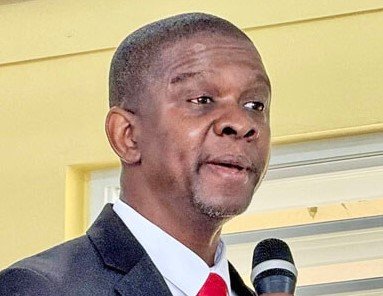Khaled El Enany’s pitch for Director-General role blends heritage, climate justice, and Caribbean cooperation
Egypt’s Khaled El Enany is taking his bid for the top job at UNESCO global. And last week, he found a willing listener nearly 10,000 kilometers from Cairo—on the small, hurricane-battered island of Grenada.
In a quiet but symbolically rich meeting held on June 20, Prime Minister Dickon Mitchell received El Enany, Egypt’s candidate for Director-General of the United Nations Educational, Scientific and Cultural Organization (UNESCO). The discussion underscored shared interests that go well beyond campaign pleasantries—touching on climate financing, cultural heritage, tourism, and the political independence of international institutions.
While it may seem like an unlikely match on paper, the exchange says a lot about how countries are positioning themselves in a post-pandemic, climate-vulnerable, and diplomatically fragmented world.
A Heritage Scholar With Global Ambitions
El Enany, a former Egyptian Minister of Tourism and Antiquities, isn’t new to cultural diplomacy.
Known for overseeing the discovery of major archaeological sites in Egypt and revitalizing key museums, his pitch to Grenada was clear: UNESCO needs less politics and more consensus, and his leadership would reflect that.
He framed his candidacy as one rooted in “technical deliberations” rather than geopolitical point-scoring. For smaller nations like Grenada, that kind of neutrality matters.
But there’s more to the story than just promises.

Grenada Pushes for Climate Justice and Heritage Recognition
Prime Minister Mitchell, himself a rising voice among Caribbean leaders, used the opportunity to spotlight a growing list of grievances—chief among them, the failure of global institutions to address the existential threat facing small island states.
He pressed for:
-
Equitable access to climate financing for countries like Grenada facing rising sea levels and intensifying storms
-
Stronger international frameworks to preserve both physical and intangible cultural heritage
For a country that has watched centuries-old buildings crumble under cyclones and oral traditions slip into silence, these aren’t abstract concerns.
“Preserving our heritage isn’t just about nostalgia—it’s survival,” a senior official in the Ministry of Culture said privately.
Tourism and Cultural Identity: A Shared Agenda
One of the less publicized, but arguably most practical, points of discussion was tourism. Grenada’s economy is tightly bound to the ebb and flow of cruise ships, boutique resorts, and cultural festivals.
El Enany offered to explore partnerships on two fronts—tourism strategy and vocational training.
That might sound bureaucratic, but for Caribbean nations competing with each other for tourist dollars and struggling to upskill their youth, it’s actually critical. The potential to combine Egypt’s deep tourism know-how with Caribbean charm has its appeal.
There’s also a shared frustration: both countries have watched heritage sites fall victim to underfunding or mismanagement, often while global institutions watch from afar.
Why Grenada’s Support Actually Matters
It’s easy to dismiss this as just another diplomatic handshake. But votes for top UN jobs don’t always come from where people expect.
UNESCO’s Director-General is selected by its Executive Board—comprising representatives from 58 member states. That means every regional alliance, especially ones as tight-knit as CARICOM (Caribbean Community), could swing the math.
Grenada’s endorsement could influence others across the Eastern Caribbean, where shared cultural and climate concerns create strong voting blocs.
And Grenada is no backbencher in regional politics. Since taking office in 2022, Mitchell has repositioned the island as an active diplomatic player, especially on issues like education, decolonization, and environmental finance.
El Enany’s Global Tour: Building Consensus or Gaining Ground?
This stop in Grenada is just one leg of El Enany’s broader campaign to secure UNESCO’s top job in 2025. Other African and European candidates are likely in the mix too, but El Enany’s pitch seems calibrated to resonate with countries tired of feeling sidelined.
He’s not just talking about pyramids and ancient tombs. He’s offering technical support, regional cooperation, and visibility for places too often ignored by international donors and decision-makers.
But behind the warm words, there are questions. Will Egypt’s track record on heritage preservation hold up to scrutiny? Can El Enany truly depoliticize an organization that has been mired in cultural disputes—from Jerusalem to Kyiv?
A Strategic Partnership in the Making?
Still, there’s something to be said for the tone of the Grenada meeting—measured, respectful, forward-looking.
At a time when diplomacy often looks like a series of crises, this was an example of soft power doing what it’s supposed to: connecting people, ideas, and institutions.
And it hinted at what the next UNESCO chief might prioritize if El Enany makes it.
• Climate resilience in cultural preservation
• Better access to tourism education and funding for vulnerable economies
• Inclusion of intangible cultural practices from underrepresented regions
One official in the Prime Minister’s Office called the meeting “subtle but significant.”
Another Caribbean diplomat put it more bluntly: “It’s rare we get approached like this, without a catch.”
The Road Ahead for El Enany—and UNESCO
As campaigning heats up, expect more of these quiet diplomatic stops from El Enany and his competitors. UNESCO isn’t just a cultural body anymore—it’s a battleground for ideas about development, history, education, and even conflict.
What Egypt’s candidate offered Grenada wasn’t just policy alignment—it was validation. That their voice, and their culture, matters on the global stage.
And if that message keeps landing, El Enany might just find himself with more support than the big countries expect.
